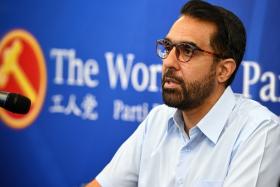Singapore needs to have diversity at the top: Ong Ye Kung
Ong Ye Kung: Having senior government leaders with different expertise, outlooks and views will help country in long term
Singapore has to ensure its top government leaders - whether political leaders, civil servants or Members of Parliament - come from a wide range of sectors, with different expertise, outlooks in life and views about Singapore's future.
"And I think if we have not done well enough, then we need to try harder," said Education Minister (Higher Education and Skills) Ong Ye Kung yesterday.
He added that this has to be the direction going forward, as diversity will help Singapore in the long term.
Mr Ong was responding to a question from a participant during a youth forum on the theme "Thriving in a disruptive world". She had observed that Singapore's top graduates tend to come from similar backgrounds - which she said can lead to the same views, and asked what could be done.
Mr Ong suggested that she may have been referring to the very top level of government, and was asking whether they are all from the same mould.
"We do our best," he said, in reference to the Government's efforts to ensure diversity.
More than 300 people attended the World Jin Jiang Youth Raffles Forum, organised by the Singapore Chin Kang Huay Kuan Youth Group, Business China and other partners.
The hour-long dialogue touched on topics such as the rise of China, how Singapore can stay competitive in the international market and social inequality.
On what can be done to ensure a fairer playing field for students from families that are not as well-to-do, Mr Ong said the Ministry of Education (MOE) has stepped into the pre-school sector and is now reserving one-third of places in its kindergartens for lower-income students.
Overall, there are now fewer Singaporeans from the lower socio-economic status compared to the past, he said.
But many find themselves "without opportunities, unable to pull themselves up".
"We got to think of ways (to help them). These are the kind of things where a national conversation would be very useful - companies, schools, institutions may have some ideas on how to do it," said Mr Ong,
He called on Singaporeans to "try our best" on these efforts.
"I think we owe it to the whole of Singapore to do this well, but be careful, don't have a solution that is worse than the problem, remember what helped us uplift everybody."
He noted that today, "the irony is that whether it is the Primary School Leaving Examinations (PSLE), scholarship system or school system, people say those are the reasons why certain groups are stuck at the bottom".
But these systems have been the greatest levellers in Singapore, Mr Ong said.
They significantly shrank the number of lower-income Singaporeans compared to 30 or 50 years ago, he added.
Scholarships are one feature of Singapore's larger system of meritocracy, "where regardless of your background and what kind of homes you grew up in, if you demonstrate that kind of achievement and ability there are scholarships, there's assistance, there are ways to lift you up and help you achieve in life."
"We were able to move up thanks to these major features in the system, so don't throw the baby out with the bathwater," said Mr Ong.
On the rise of China, Mr Ong said that Singapore can continue to act as a bridge between the East and the West in the years ahead, and that many Chinese officials still hold Singapore in high regard.
He disagreed with a participant's suggestion that Singapore will be bypassed by bigger powers as the pace of globalisation quickens.
Citing his work in co-chairing the Singapore-Guangdong Collaboration Council, Mr Ong said that if you put aside fake news, "it's actually a deep relationship that we have with China, and we should continue to build on that."
Get The New Paper on your phone with the free TNP app. Download from the Apple App Store or Google Play Store now


